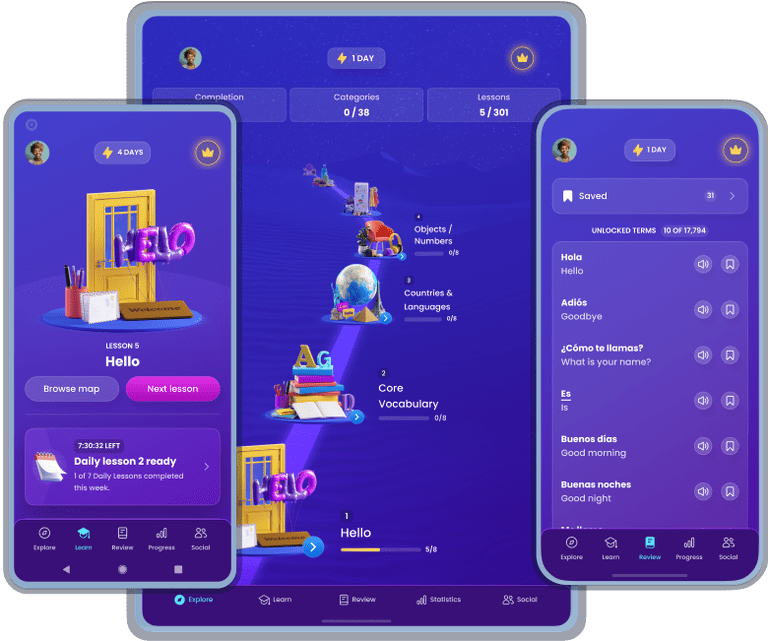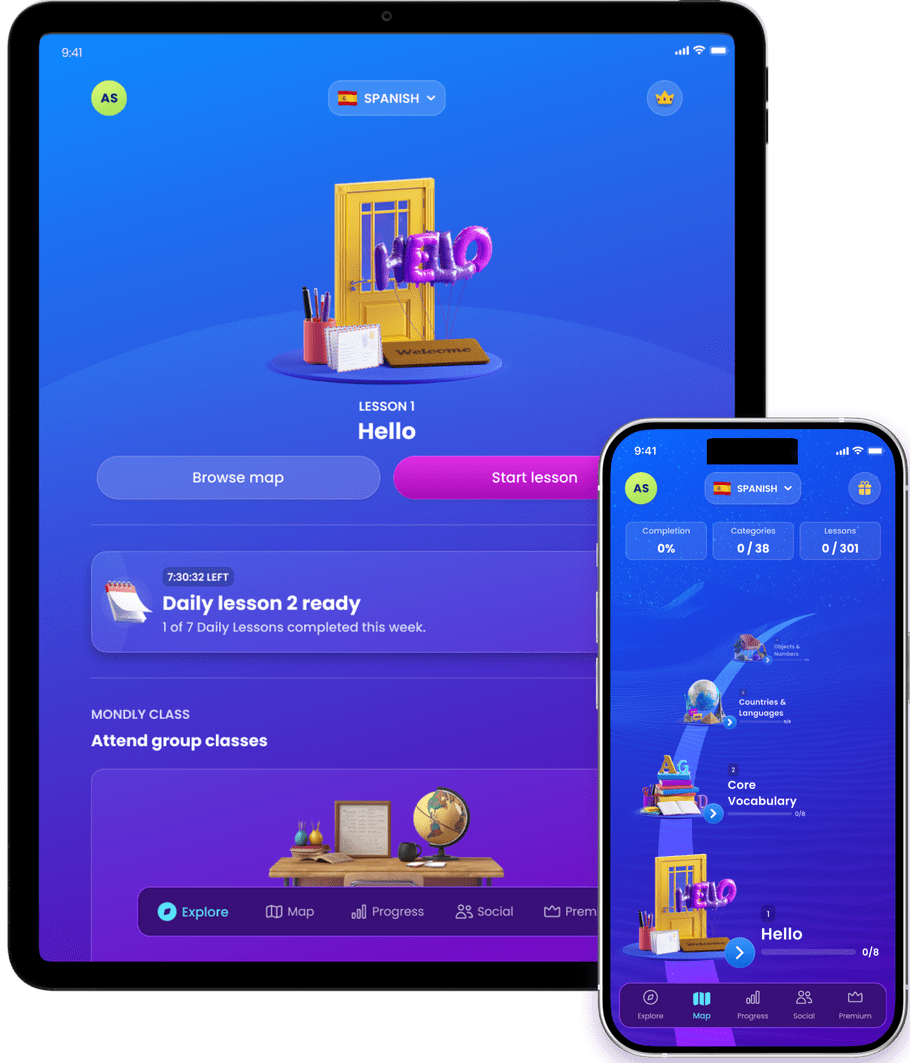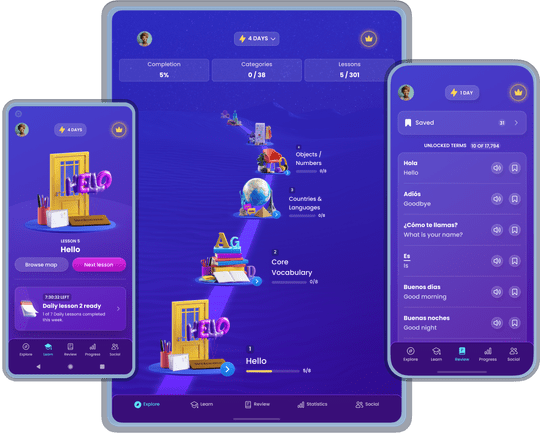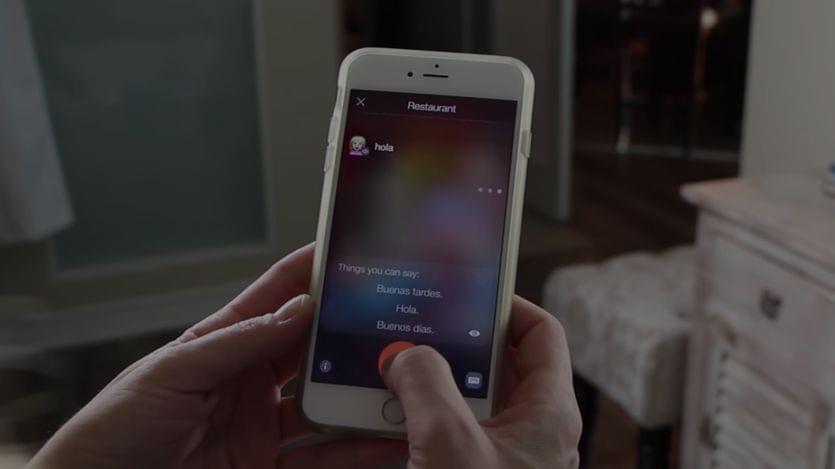How to speak Spanish fluently in no time
How to speak Spanish fluently

Spanish Speaking Exercises
Speak Spanish fluently from day 1
Did you know that learning by doing is the most effective learning method? Practice Spanish a little bit every day and you’ll speak like a native forever! Start right now with these top 10 most common Spanish words and phrases pronounced by fluent Spanish speakers.
1. Hola. = Hello.
First impressions matter. Don’t let anyone tell you otherwise. A word as simple as “hello” in Spanish can work wonders in your interactions with the natives. So here’s exactly how to pronounce it:
Hola.
2. ¿Cómo estás? = How are you?
The next polite thing to do is ask “how are you?”. Sometimes, you can even skip the hello and directly ask how things are going. Here’s how to pronounce it in Spanish:
¿Cómo estás?
3. ¿Cómo te llamas? = What is your name?
When you travel abroad, you usually make a lot of new friends. Whether we are talking about the nice stranger on the plane, your host or the driver, here’s how to ask them what their name is:
¿Cómo te llamas?
4. Encantada. = Nice to meet you.
The natives will always regard your attempt to speak their language as a sign of respect towards their culture. Another basic phrase you can use when making new friends is “nice to meet you”. Click and listen to how is it pronounced:
Encantada.
5. Por favor. = Please.
Manners are a must everywhere you go. And Spain makes no exception. Saying “please” the right way and at the right time will open many doors in your path. To pronounce it in Spanish, you simply say:
Por favor.
6. Gracias. = Thank you.
Mothers are the best thing that ever happened to us. Not only did they raise us, but they also taught us basic manners like saying “thank you” in the proper contexts. Following their example, here’s how to say “thank you” in Spanish:
Gracias.
7. De nada. = You're welcome.
It doesn't matter where you are in the world. Common sense translates the same in all languages. Here's how a person from Madrid would say “you’re welcome”:
De nada.
8. ¡Disculpe! = Excuse me!
We only need 7 seconds to make an impression that may last a lifetime. And sometimes, the only difference between a good impression and a bad one is just a simple “excuse me”. Listen to how it's pronounced in Spanish:
¡Disculpe!
9. ¿Cuánto cuesta esto? = How much does it cost?
Shopping sprees are an essential part of every city break. The vacation isn’t over until you buy souvenirs for each member of your family. So here’s how to ask “how much does it cost?” in Spanish:
¿Cuánto cuesta esto?
10. Adiós. = Goodbye.
If you want to maintain the good first impression you managed to make with your flawless Spanish greetings and introductions, end the conversation by saying “goodbye” exactly like a native:
Adiós.




1 000 000+ + Ratings
Mondly was named "Editors' Choice" in Google Play and "Best New App" by Apple.
Basic Spanish pronunciation rules
Let’s move to some practical examples and see what some of the most important Spanish pronunciation rules are:
- ● “r” sound – there are two different types of sounds this letter can create: the r suave (soft r) and the r fuerte (strong r) which can cause pronunciation difficulties when:
- - there are two r’s in a row (e.g. arriba)
- - there is a single “r” at the beginning of a word (e.g. rojo)
- - there is a single “r” after the letters “l,” “n,” or “s” (e.g. alrededor)
- - there is a single “r” after the prefix sub (e.g. subrayar)
- ● “d” sound – Try to create a softer sound by barely touching the back of your teeth with your tongue. Practice by saying dirección.
- ● "h" sound – It is a silent letter by itself. For example, hola is pronounced as if it was spelled ‘ola’.
- ● "v" and "b" sounds – Their pronunciation changes depending on their position in a word. At the beginning of a word, both ‘v’ and ‘b’ will sound like a hard ‘b’. In the middle of a word, it’s a much softer ‘b’.
- ● "j" sound – Can change based on the speaker. Those who are speaking traditional Spanish will have the “j” make an “h” sound. It would be similar to the English sound for “h”, but harder.


Speak Spanish in Virtual Reality
Mondly VR is the most advanced way to speak a new language without traveling. What makes it so? It gives learners the one thing anyone needs after learning a new language: the confidence to speak it. By simulating reality, it engages you in useful conversations and offers instant feedback on pronunciation. This provides a safe space that prepares learners to go out into the world and interact in a new language. Everyone should be able to speak their desired language without second-guessing themselves.
Now let’s be honest. There’s yet another reason why many of us don’t get to practice speaking Spanish with native speakers: we can’t afford a weekly trip to Spain. But Mondly VR can bring Spain to us. Get ready to practice small-talk on a train to Madrid, book a hotel room in Barcelona, or order food in a restaurant in Toledo – all from the comfort of your home.
Like talking to an old friend, speaking Spanish has never been as easy as it is in VR!


Spanish accents from around the world

● Castilian Spanish: spoken in the north of Spain.
● Andalusian Spanish: found in the south of Spain and spread out beyond Andalusia.
● Canarian Spanish: spoken throughout the Canary Islands; has a lot in common with Andalusian Spanish.
● Caribbean Spanish: introduced to the Caribbean region with the voyages of Christopher Columbus; is more similar to Canarian and Andalusian Spanish than Castilian Spanish.
● Mexican Spanish: refers to a variety of dialects of the Spanish language spoken in Mexican territory.
● Austral (Rioplatense) Spanish: spoken mainly in and around the Río de la Plata Basin of Argentina and Uruguay, but also found in south and eastern Bolivia and Paraguay.
● Chilean Spanish: spoken in most of Chile.

Speaking Spanish has major benefits

Being able to speak with over 570 million Spanish speakers
Spanish is the 3rd most spoken language worldwide, so you'll definitely have a lot to gain by learning conversational Spanish. For example, you'll be able to interact with people anytime you visit Peru, Argentina or Spain.

Traveling to Spanish speaking countries gets way better
Whether you plan to travel to Mexico, Spain or Colombia, speaking Spanish will enhance your experience significantly. You will be able to experience Spanish speaking countries like a native and have an authentic experience in the process.

Speaking Spanish can save your career
Being able to speak Spanish increases your employability significantly and makes you stand out from the crowd. This means that you will have better chances of getting a well paid job in the first place, better chances of getting promoted or getting a better job in a Spanish speaking country.

Speaking Spanish makes you smarter
Studies indicate that being bilingual or a polyglot increases the grey matter in your brain. This means that speaking Spanish makes you smarter than you currently are. So, what are you waiting for?














